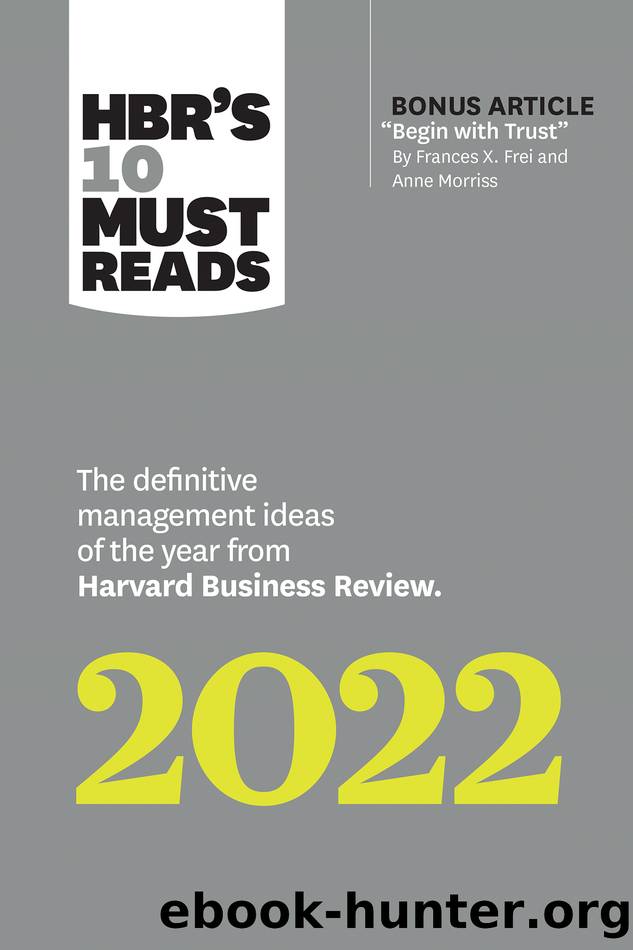HBR's 10 Must Reads 2022 by Harvard Business Review

Author:Harvard Business Review
Language: eng
Format: epub
Publisher: Harvard Business Review Press
Published: 2021-10-12T00:00:00+00:00
Moral Risk
Products and services that make decisions autonomously will also need to resolve ethical dilemmasâa requirement that raises additional risks and regulatory and product development challenges. Scholars have now begun to frame these challenges as problems of responsible algorithm design. They include the puzzle of how to automate moral reasoning. Should Tesla, for example, program its cars to think in utilitarian cost-benefit terms or Kantian ones, where certain values cannot be traded off regardless of benefits? Even if the answer is utilitarian, quantification is extremely difficult: How should we program a car to value the lives of three elderly people against, say, the life of one middle-aged person? How should businesses balance trade-offs among, say, privacy, fairness, accuracy, and security? Can all those kinds of risks be avoided?
Moral risks also include biases related to demographic groups. For example, facial-recognition algorithms have a difficult time identifying people of color; skin-lesion-classification systems appear to have unequal accuracy across race; recidivism-prediction instruments give Blacks and Hispanics falsely high ratings, and credit-scoring systems give them unjustly low ones. With many widespread commercial uses, machine-learning systems may be deemed unfair to a certain group on some dimensions.
The problem is compounded by the multiple and possibly mutually incompatible ways to define fairness and encode it in algorithms. A lending algorithm can be calibratedâmeaning that its decisions are independent of group identity after controlling for risk levelâwhile still disproportionately denying loans to creditworthy minorities. As a result, a company can find itself in a âdamned if you do, damned if you donâtâ situation. If it uses algorithms to decide who receives a loan, it may have difficulty avoiding charges that itâs discriminating against some groups according to one of the definitions of fairness. Different cultures may also accept different definitions and ethical trade-offsâa problem for products with global markets. A February 2020 European Commission white paper on AI points to these challenges: It calls for the development of AI with âEuropean values,â but will such AI be easily exported to regions with different values?
Finally, all these problems can also be caused by model instability. This is a situation where inputs that are close to one another lead to decisions that are far apart. Unstable algorithms are likely to treat very similar people very differentlyâand possibly unfairly.
All these considerations, of course, donât mean that we should avoid machine learning altogether. Instead, executives need to embrace the opportunities it creates while making sure they properly address the risks.
Download
This site does not store any files on its server. We only index and link to content provided by other sites. Please contact the content providers to delete copyright contents if any and email us, we'll remove relevant links or contents immediately.
Kathy Andrews Collection by Kathy Andrews(10693)
The remains of the day by Kazuo Ishiguro(7684)
Spare by Prince Harry The Duke of Sussex(4321)
Paper Towns by Green John(4255)
The Body: A Guide for Occupants by Bill Bryson(3959)
Be in a Treehouse by Pete Nelson(3286)
Harry Potter and the Goblet Of Fire by J.K. Rowling(3223)
Goodbye Paradise(3057)
Never by Ken Follett(3020)
Into Thin Air by Jon Krakauer(2777)
The Remains of the Day by Kazuo Ishiguro(2691)
The Cellar by Natasha Preston(2688)
The Genius of Japanese Carpentry by Azby Brown(2679)
Industrial Automation from Scratch: A hands-on guide to using sensors, actuators, PLCs, HMIs, and SCADA to automate industrial processes by Olushola Akande(2634)
Drawing Shortcuts: Developing Quick Drawing Skills Using Today's Technology by Leggitt Jim(2595)
120 Days of Sodom by Marquis de Sade(2507)
Machine Learning at Scale with H2O by Gregory Keys | David Whiting(2437)
Architecture 101 by Nicole Bridge(2419)
The Man Who Died Twice by Richard Osman(2416)
